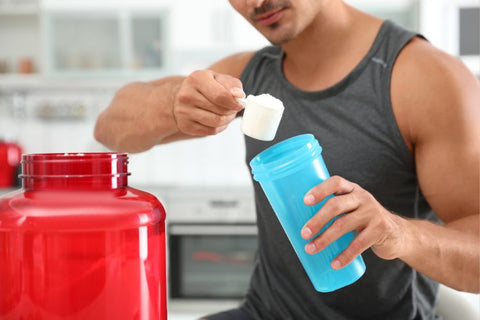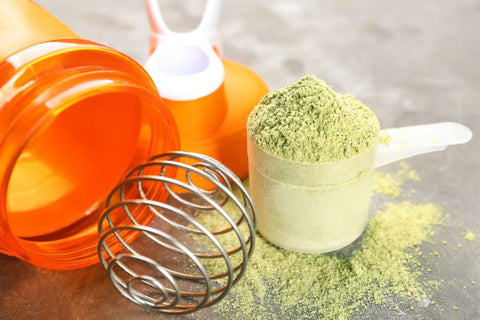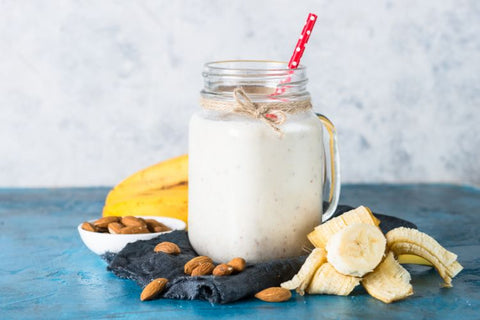Athletes face the challenge of optimizing nutrition, especially when considering protein intake for muscle repair and growth. For those with gluten sensitivities or celiac disease, finding suitable protein sources can be tough. Enter gluten-free protein powders – a solution offering benefits beyond traditional protein sources. This article explores how gluten-free protein powders can enhance athletic performance in various ways.
Muscle Recovery
Following an intense workout, your body goes into repair mode, rebuilding and strengthening muscle tissue. Here's where gluten-free protein powders can play a valuable role in your post-workout recovery:
The Protein-Muscle Connection
- Muscle Breakdown During Exercise: During exercise, especially strength training, your muscles experience microscopic tears. This breakdown is a natural part of the muscle-building process.
- Protein for Repair and Rebuilding: Your body needs protein to repair and rebuild these microtears. Protein provides the building blocks (amino acids) for muscle tissue synthesis, which is the process of creating new muscle fibers.
Gluten-Free Protein Powders to the Rescue
- Convenience and Concentration: Gluten-free protein powders offer a convenient and concentrated way to increase your protein intake, especially if you struggle to meet your needs through whole food sources alone. This ensures your body has the raw materials it needs for optimal muscle repair and growth.
- Faster Absorption: Protein powders are generally absorbed faster than whole food sources of protein. This can be beneficial after a workout when your muscles are primed to receive nutrients for repair.
- Specific Amino Acids for Muscle Building: Many gluten-free protein powders, particularly those derived from soy or peas, are rich in branched-chain amino acids (BCAAs). BCAAs are readily taken up by muscles and play a crucial role in muscle protein synthesis.
Pre-Workout Fuel
Contrary to popular belief, gluten-free protein powders aren't a direct source of pre-workout energy like a sugary snack. However, they can offer some indirect benefits that contribute to sustained energy and potentially support overall workout performance:
Staving Off Crashes
- Satiety and Blood Sugar: Protein is known for its satiating properties. Consuming a protein shake before a workout can help you feel fuller for longer, preventing dips in blood sugar that can lead to fatigue and decreased energy levels during your workout.
Potential Benefits for Endurance
- Muscle Glycogen Stores: Glycogen is the primary fuel source for muscles during exercise. Studies suggest that consuming protein before exercise, particularly with carbohydrates, might help preserve muscle glycogen stores. This can potentially delay fatigue and extend endurance during longer workouts.
- Muscle Protein Breakdown: During exercise, especially intense workouts, your body can break down muscle tissue for energy. Consuming protein beforehand may help minimize this breakdown, potentially allowing you to perform at a higher intensity for a longer duration.
Convenient and Portable
For athletes, maintaining optimal nutrition is crucial for peak performance. However, busy training schedules, travel demands, and competition logistics can often create significant challenges in obtaining proper protein intake. This is where gluten-free protein powders emerge as a valuable tool, offering unparalleled convenience and portability for athletes on the go.
Effortless Preparation:
- Ready-to-Mix Advantage: Unlike whole-food protein sources that require cooking or preparation, gluten-free protein powders are pre-portioned and require minimal effort. A simple scoop, mixed with water or a preferred liquid (milk, plant-based milk), translates to a protein-rich drink ready to fuel your body. This saves valuable time, especially during hectic training schedules or when traveling.
- Versatility Beyond the Shake: Protein powders offer versatility beyond just shakes. Athletes can blend them into yogurt, oatmeal, smoothies, or even use them for baking protein pancakes or waffles. This allows for easy incorporation of protein powder into the diet in various ways, catering to individual preferences and dietary needs.
Unmatched Portability:
- Compact and Lightweight: Protein powders come in convenient, resealable containers or single-serving packets. Unlike bulky containers of whole-food protein sources like meat or fish, these compact and lightweight options are ideal for athletes constantly on the move. They can easily fit into gym bags, travel luggage, or even a purse, ensuring access to a protein source practically anywhere, anytime.
- Shelf-Stable Advantage: Most gluten-free protein powders are shelf-stable, eliminating the need for refrigeration. This is a major benefit for athletes who travel frequently or lack access to constant refrigeration, especially during competitions or training camps. They can ensure a protein source is readily available without worrying about spoilage.
Customizable Nutrition
Athletes have diverse nutritional needs depending on their sport, training intensity, and individual goals. Gluten-free protein powders offer a versatile base to customize your nutritional intake and meet your specific energy and nutrient requirements. Here's how you can leverage these powders for a personalized approach:
Customizing Protein Powders
- Protein Source: Choose a gluten-free protein powder that aligns with your dietary preferences. Popular options include whey (dairy-based), casein (dairy-based), pea, brown rice, soy, or hemp protein. Each source has a different amino acid profile and absorption rate. Experiment to find one that suits your needs and digestive tolerance.
- Flavor Variety: Don't be limited by plain protein powder. Explore flavored options or add natural flavorings like fruits, cocoa powder, or spices to create a delicious and enjoyable protein drink.
- Nutrient Boosts: Enhance your protein powder with additional ingredients to target specific needs. Here are some examples:
- Energy Boost: For pre-workout energy, blend your protein powder with fruits (bananas, berries) or complex carbohydrates like oats for sustained energy.
- Healthy Fats: For sustained satiety and improved nutrient absorption, consider adding healthy fats like nut butter (almond, peanut), avocado, or chia seeds.
- Micronutrient Enhancement: Green vegetables (spinach, kale) or fruits rich in vitamins and minerals can be blended with protein powder for a more micronutrient-dense drink.
- Post-Workout Recovery: Adding fruits with antioxidants (berries) or complex carbohydrates (sweet potato) can aid muscle recovery after intense workouts.
Blending for Specific Requirements
- Strength Training and Muscle Building: Focus on protein powders with a complete amino acid profile, like whey or soy protein. Blend them with complex carbohydrates (oats, whole-wheat bread) and healthy fats (nut butters) for post-workout recovery and muscle growth support.
- Endurance Athletes: Protein powder combined with fruits for quick energy and complex carbohydrates like bananas or sweet potato can provide sustained energy during long training sessions. Consider adding electrolytes (coconut water) to replenish minerals lost through sweat.
- Weight Management: Use water or unsweetened plant-based milk as your base. You can add low-calorie fruits like berries or vegetables for additional nutrients without adding significant calories. Consider protein powders with lower calorie content, such as pea or brown rice protein.
Hydration Support
While not all gluten-free protein powders contain electrolytes, there are some formulated specifically for athletes that do. Here's how these electrolyte-enhanced powders can support hydration, prevent muscle cramps, and combat fatigue during workouts:
Electrolytes: The Body's Essential Conductors
- Maintaining Fluid Balance: Electrolytes are minerals that conduct electricity in the body and play a crucial role in maintaining fluid balance. They are lost through sweat during exercise, and proper hydration is essential for optimal performance.
- Key Electrolytes for Athletes: Sodium, potassium, chloride, calcium, and magnesium are some of the important electrolytes lost through sweat. These minerals are involved in muscle function, nerve transmission, and maintaining blood volume.
Electrolyte-Enhanced Protein Powders and Hydration
- Replenishing Losses: By containing electrolytes, these protein powders allow athletes to replenish minerals lost through sweat during workouts. This helps maintain proper hydration, which is vital for regulating body temperature, delivering nutrients to muscles, and removing waste products.
- Combating Dehydration: Dehydration can lead to fatigue, decreased performance, and an increased risk of muscle cramps. Electrolyte-enhanced protein powders can help prevent dehydration by promoting fluid retention and ensuring proper electrolyte balance.
Reduced Inflammation
The research on the anti-inflammatory effects of specific gluten-free protein sources like pea protein and exercise-induced inflammation is ongoing and somewhat inconclusive. Here's a breakdown of what we know so far:
Exercise-Induced Inflammation
-
Microscopic Tears and Repair: During exercise, especially strength training, microscopic tears occur in muscle fibers. This breakdown is a natural part of the muscle-building process, and inflammation is a normal response to initiate tissue repair.
-
The Downside of Inflammation: While some inflammation is necessary for repair, excessive or prolonged inflammation can hinder recovery and lead to muscle soreness and pain.
Pea Protein and Inflammation: A Promising Area of Research
-
Limited Studies: There are limited human studies directly investigating the effects of pea protein on exercise-induced inflammation. Some studies suggest potential benefits, while others show no significant difference compared to other protein sources.
-
Antioxidant and Anti-inflammatory Properties: Pea protein contains certain bioactive compounds with potential antioxidant and anti-inflammatory properties. These compounds might help regulate the inflammatory response after exercise, potentially leading to faster recovery.
Weight Management for Athletes
Athletes striving for peak performance often walk a tightrope between consuming enough calories for energy and managing their weight to maintain optimal performance in their specific sport. Here's how gluten-free protein powders can be a valuable tool for athletes aiming to control weight while supporting muscle mass:
Protein's Role in Weight Management:
-
Satiety and Appetite Control: Protein is known for its satiating properties. Consuming protein powder before or after meals can help athletes feel fuller for longer, potentially reducing overall calorie intake and aiding in weight management.
-
Muscle Preservation: During weight management efforts, muscle loss is a concern. Protein provides the building blocks for muscle tissue. Including protein powder in the diet can help athletes maintain muscle mass while reducing calorie intake.
Gluten-Free Protein Powders: Low-Calorie, High-Protein Options:
-
Variety in Calorie Content: Not all protein powders are created equal. Gluten-free protein powders come in various formulations, with some offering lower calorie contents per serving. Athletes can choose options that fit their specific calorie needs.
-
Protein Concentration: Protein powders offer a concentrated source of protein with minimal calories from carbohydrates or fats. This allows athletes to increase their protein intake without significantly impacting their overall calorie intake.
Optimizing Weight Management for Athletes:
-
Focus on Whole Foods: While protein powders offer a convenient option, athletes should prioritize whole food protein sources like lean meats, fish, eggs, and legumes for a balanced diet and additional micronutrients.
-
Portion Control Matters: Even low-calorie protein powders can contribute to weight gain if consumed in excess. Athletes should adhere to recommended serving sizes and factor protein powder intake into their overall calorie budget.
-
Combine with Other Strategies: For effective weight management, protein powders should be used alongside a healthy diet, proper portion control, and regular exercise. Consulting a registered dietitian or sports nutritionist can help create a personalized weight management plan.
Adaptable to Different Diets
For athletes with gluten sensitivities or celiac disease, gluten-free protein powders offer a significant advantage in ensuring a safe and effective protein source without compromising their performance. Here's how these powders address their specific needs:
Safe and Reliable Protein Source:
- Avoiding Gluten Contamination: Traditional protein powders may contain traces of gluten from wheat, barley, or rye due to cross-contamination during processing. Gluten-free protein powders are specifically formulated to be free of these grains, eliminating the risk of accidental gluten exposure for athletes with celiac disease or gluten sensitivities.
- Peace of Mind for Optimal Performance: Athletes with gluten sensitivities or celiac disease can be confident that gluten-free protein powders are safe for consumption. This allows them to focus on training and performance without worrying about potential adverse reactions from gluten contamination.
Maintaining Performance with Adequate Protein Intake:
- Supporting Muscle Growth and Repair: Protein is crucial for muscle growth, repair, and recovery after exercise. Athletes with gluten sensitivities or celiac disease might struggle to meet their protein needs solely through gluten-containing foods. Gluten-free protein powders offer a convenient and concentrated way to increase protein intake, supporting muscle function and performance.
- Variety of Protein Sources: Gluten-free protein powders are available in various forms, such as whey, pea, rice, and soy protein. This allows athletes to choose a source that aligns with their dietary preferences and potential sensitivities to specific protein types.
Considerations for Athletes with Gluten Sensitivities or Celiac Disease:
- Certification Matters: Look for protein powders with certifications from reputable organizations like the Gluten-Free Certification Organization (GFCO) to guarantee they meet strict gluten-free standards.
- Label Reading is Crucial: Always carefully read the ingredient label to ensure the protein powder is truly gluten-free and free from any hidden sources of gluten.
- Consulting a Nutritionist: A registered dietitian or sports nutritionist can help athletes with gluten sensitivities or celiac disease create a personalized meal plan to ensure they meet their protein needs while adhering to their dietary restrictions. They can also recommend specific protein powder options that best suit their individual needs.
Conclusion
Gluten-free protein powders have emerged as a valuable asset for athletes seeking to optimize their nutrition and enhance performance. From aiding in muscle recovery to providing convenient and portable options, these powders offer a versatile solution for individuals with gluten sensitivities or celiac disease. With the ability to customize nutrition, support hydration, and aid in weight management, gluten-free protein powders empower athletes to meet their unique dietary needs while striving for peak performance.






